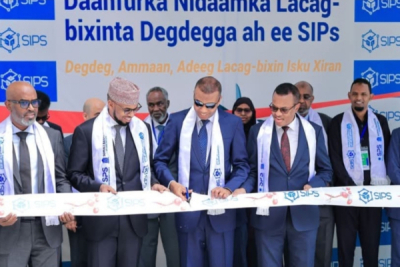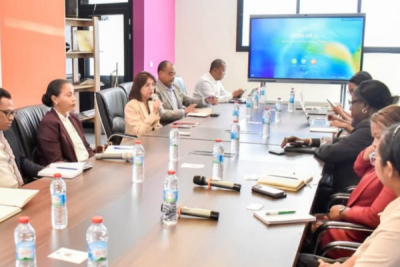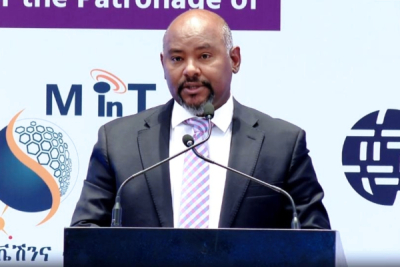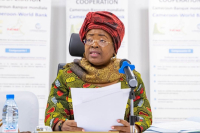After achieving significant growth in smaller cities across eastern Algeria, logistics startup Wajeez has successfully expanded to the capital, Algiers. The company now plans to expand its operations to other countries throughout the African continent.
Founded in 2018 as FoodBeeper by Mohamed Salah Tourab, Wajeez is a digital platform that streamlines the delivery of meals and fresh produce. Since its inception, the startup has broadened its services to encompass a variety of items and personalized shopping experiences.
The Wajeez mobile app, available on both iOS and Android, has been downloaded over 100,000 times according to data from the Google Play Store. After creating an account, users can easily utilize the search bar at the top of the page to locate specific items or partner stores. They can then add products to their cart, complete the checkout process, and receive their deliveries.
When users search for a store, they gain access to its entire catalog. Additionally, Wajeez features a loyalty program that offers rewards, discounts, and a premium service.
Wajeez Gold is a subscription service that provides access to exclusive offers. With a monthly subscription, users can enjoy 5% cashback on all food orders, earn double loyalty points for quicker rewards, and unlock the Courier service, which allows them to send, receive, and purchase anything they desire within their city without hassle.
The platform is currently operational in 13 cities across Algeria. In 2023, it expanded its reach to Dakar, Senegal, marking an important milestone in its African expansion plan.
By Adoni Conrad Quenum
Editing by Febriol Bewa
He has approximately seven years of experience in business finance and evaluation. With GoGetta, he aims to empower African entrepreneurs by providing access to funding for their projects.
Sthembiso Zwane (photo) is a South African finance expert and tech entrepreneur. He is the co-founder and CEO of GoGetta, a startup specializing in venture capital and private equity.
Founded in 2022, GoGetta connects venture capital opportunities in Africa with investors worldwide. The company identifies high-growth African businesses in need of funding and links them with potential investors.
Through GoGetta, international investors can fund promising African companies in exchange for equity stakes. Before listing a company on its platform, the startup conducts a rigorous evaluation of its financial health, market position, leadership capabilities, and growth potential, ensuring optimal returns for its investors.
Sthembiso Zwane has been serving, since 2013, as a marketing and finance assistant at the KwaZulu-Natal Society for the Blind (KZNSB), an organization advocating for the rights of blind and visually impaired individuals in the KwaZulu-Natal region. Additionally, he works as an investment professional at Grovest Corporate Advisory, an investment firm.
Zwane holds a bachelor’s degree in financial management from IIE Varsity College in South Africa, which he earned in 2015. Between 2019 and 2022, he worked as an investment manager at Fulo Capital, a housing fund focused on student accommodation with an emphasis on impact investment.
In 2023, he was recognized as one of the 200 Most Influential Young South Africans by Mail & Guardian magazine.
By Melchior Koba,
Editing by Sèna D. B. de Sodji
With the ongoing digital transformation, instant payment systems are emerging as key solutions to ensure fast, secure, and accessible transactions. They are essential for modernizing economies and providing more efficient and inclusive banking services.
Somali Prime Minister Hamza Abdi Barre on Wednesday launched the Somali Instant Payment System (SIPS). Developed jointly by the Central Bank of Somalia (CBS) and the Somali Bankers Association, SIPS is designed to facilitate instant, secure, and transparent transactions between local banks.
“For our country to rebuild, we must support the private sector and investment. We are preparing laws to safeguard people’s finances, prevent terrorist funding, and implement government plans that are central to the security, economy, and development of Somali society” said Hamza Abdi Barre during the launch event.
SIPS serves as a centralized platform connecting the CBS and local private banks, enabling real-time money transfers between financial institutions. The system aims to reduce interbank payment delays, eliminate inefficiencies, and minimize the risks associated with cash transactions, which remain prevalent in the country. Key stakeholders include the CBS, which oversees and regulates the system, and private banks, which act as access points for businesses and individuals.
The launch comes as Somalia pursues economic recovery, seeking to modernize its financial infrastructure and promote the digitization of services. By implementing a modern payment system, the Somali government aims to boost investor confidence, strengthen efforts to combat illicit financial practices, and enhance transparency in financial transactions.
With SIPS, Somalia enters a new economic era. The system is expected to not only improve banking efficiency and enhance the competitiveness of local businesses but also contribute to overall economic growth. It paves the way for inclusive prosperity for Somali citizens and lays the foundation for a resilient and innovative economy.
By Samira Njoya,
Editing by Sèna D. B. de Sodji
He is dedicated to providing financial services that transform the lives of individuals and businesses across Africa. His primary goal is to promote financial inclusion throughout the continent.
Ken Kakena (photo), a tech entrepreneur from the Democratic Republic of Congo (DRC), is the co-founder and CEO of fintech startup Mekka Group. Founded in 2024, Mekka Group develops technological infrastructure aimed at transforming how businesses in Africa make and receive payments. It offers tailored financial solutions to help companies place orders, pay suppliers, collect payments, access instant credit, and track their financial activities in real-time.
Mekka Group provides personalized financial solution that allows businesses to place orders, pay suppliers, collect payments, access instant credit, and monitor their finances in real time. Whether for freelancers, merchants, or large corporations, the startup adapts to the specific needs of each client.
The company also facilitates the sending of electronic invoices and receipts. In terms of payments, the startup enables users to accept transactions via mobile money or cash from anywhere and transfer funds to their bank accounts.
Before Mekka Group, Ken Kakena co-founded Wizall Money in 2015, a startup specializing in mobile money solutions for businesses, organizations, and governments to handle disbursement and collection operations. It operates in Senegal, Mali, Burkina Faso, and Côte d’Ivoire.
Ken Kakena holds a master’s degree in marketing, which he earned in 2012 from ISTEC Business School Paris, a higher education institution specializing in business and marketing. Before embarking on his entrepreneurial journey, he worked from 2013 to 2016 as a mobile financial services consultant at Advise Consulting & Technology, a company specializing in organizational, management, and business training consulting.
With Wizall Money, Ken Kakena received the Makatuno Prize in 2019, which honors individuals and companies that have elevated the DRC’s reputation internationally. In 2021, Wizall Money also won the award for Best Digital Innovation Company at the annual event Calebasses de l’excellence Awards.
By Melchior Koba,
Editing by Sèna D. B. de Sodji
Madagascar aims to accelerate the digital transformation of all sectors of the economy. Last week, the government identified two pilot sites to launch the country's hospital digitization program.
The Malagasy government plans to transform the National Center for Distance Learning of Madagascar (CNTEMAD) into a digital university. A working meeting was held on Tuesday, January 21, bringing together various stakeholders: the Ministry of Higher Education and Scientific Research, the Ministry of Digital Development, Posts, and Telecommunications, the CNTEMAD leadership, and the Agence Universitaire de la Francophonie (AUF), which serves as the technical partner for the initiative.
During the meeting, the parties discussed the technical improvements necessary for the project’s implementation. “One of the agenda items was the development of a timeline for the project’s implementation, as well as the coordination of the technical aspects required for its realization,” informed the Ministry of Digital Development, Posts, and Telecommunications in a press release, without providing further details.
Established in 1992, CNTEMAD primarily relies on printed materials for instruction, supplemented by assignments, in-person group sessions, and practical ICT-focused exercises. The institution encourages group work and offers audiovisual resources upon request. Examinations are conducted twice a year. In 2024, CNTEMAD served approximately 17,000 students. Its transformation into a digital university aligns with efforts to digitize the national education system as part of a broader national digital transformation initiative.
In July 2024, the government launched the process of digitizing schools across the country. The project aims to equip administrative and educational zones and institutions with tools and resources to leverage digital technologies effectively.
However, challenges remain. Internet availability and access to compatible devices (computers, tablets, smartphones) may limit student access to the digital university's platforms. According to the Communication Technology Regulation Authority (ARTEC), internet penetration in Madagascar was 32.57% in 2024, with an estimated population of 30.3 million.
By Isaac K. Kassouwi,
Editing by Sèna D. B. de Sodji
With over 120 million inhabitants, Ethiopia has an immense digital potential.
The country is actively working to expand internet access, modernize its infrastructure, and embrace innovative technological solutions.
Ethiopia is working to accelerate internet development and bridge the digital divide, Minister of Innovation and Technology Belete Molla said on Monday. Speaking at the opening of the Internet Development Conference (IDC), Molla emphasized the government's commitment to building an inclusive and dynamic digital ecosystem for all citizens.
The Digital Ethiopia 2030 strategy will serve as a roadmap for this effort, guiding the modernization of internet infrastructure, raising digital literacy awareness, and promoting responsible technology use. The government also aims to collaborate closely with member countries of the Intergovernmental Authority on Development (IGAD) to improve connectivity in remote areas and ensure equitable and secure internet access.
Ethiopia has made significant progress in recent years. 4G coverage now reaches 34.8% of the population, and 5G services are available in 14 cities. The country currently boasts 80.5 million mobile subscribers and 45 million broadband users. Innovative solutions like Telebirr, a mobile payment service with 51.54 million users, demonstrate the potential of digital technology to drive financial inclusion and transform economic transactions.
The GSMA's Digital Economy Ethiopia Report forecasts further growth in connectivity, with more than 50 million Ethiopians expected to be connected to mobile internet by 2028, nearly double the current figure. This increased connectivity could contribute approximately $2.5 billion to the agricultural sector and $2 billion to the manufacturing industry by 2028.
These advancements are expected to solidify Ethiopia's role as a driver of digital transformation within the IGAD region while delivering sustainable economic and social benefits for its citizens.
By Samira Njoya,
Editing by Sèna D. B. de Sodji
Artificial Intelligence (AI) is now a key driver of progress for nations. It provides innovative solutions to economic and social challenges, promoting the modernization of infrastructure, the optimization of public services, and competitiveness on the global stage.
Cameroon is developing a national strategy for artificial intelligence (AI), Minister of Posts and Telecommunications Minette Libom Li Likeng (photo) announced on Tuesday.
The strategy, currently under development, aims to position Cameroon as a key player in the global AI ecosystem, focusing on sectors such as health, agriculture, education, and governance.
"The strategy aims to position Cameroon as a key player in the global AI ecosystem, with a particular focus on strategic sectors such as health, agriculture, education, and governance. It is crucial to establish robust mechanisms to ensure responsible AI, strengthen digital infrastructure, develop local skills, and promote innovation," Li Likeng said at the opening ceremony of national consultations for the 2025 roadmap for the postal, telecommunications, and ICT sectors.
This initiative is part of the digital transformation acceleration project and is expected to contribute to the implementation of the National Development Strategy (SND30) and “Vision 2035.” These projects aim to transform Cameroon into “an emerging, democratic, and united country in its diversity” through structural economic transformation and inclusive development.
Once established, the national AI strategy will allow Cameroon to join other African countries, such as Benin, Nigeria, and Senegal, which have already adopted similar documents. Additionally, countries like Congo and Tunisia are also working on national AI strategies.
Cameroon’s strategy is designed not only to boost innovation and competitiveness through AI but also to address several major challenges. It will tackle ethical issues, ensure cybersecurity, and encourage effective data management. This will help maximize economic benefits and enhance the well-being of the population while mitigating the risks associated with emerging technologies.
Furthermore, the strategy is expected to improve Cameroon’s AI Investment Potential Index. This index, highlighted in the report “AI Investment Potential Index: Mapping Global Opportunities for Sustainable Development” published by the French Development Agency (AFD), measures a country's ability to attract AI investments based on criteria such as technological infrastructure, available skills, regulatory frameworks, and market potential.
Currently, Cameroon scores 30 out of 100 on this index, alongside countries like Angola, Guinea, Ethiopia, and Burkina Faso. This ranking underscores significant development opportunities while highlighting the efforts needed to enhance its attractiveness and fully leverage AI’s potential.
By Samira Njoya,
Editing by Sèna D. B. de Sodji
With the rise of e-commerce, logistics services are keeping pace with the trend. In Mali, a startup has decided to digitize various establishments in Bamako to offer their services to the population through its mobile application.
Livrado is a logistics solution developed by a Malian startup. It offers on-demand delivery and storage services within the city of Bamako and its surrounding areas. Founded in 2022 by CEO Aicha Diallo, Livrado allows users to order and have meals delivered, shop at supermarkets, run errands, and send and receive mail through its platform.
The startup partners with numerous restaurants, supermarkets, and grocery stores in the Malian capital. It also employs young people as delivery drivers who register on the Livrado platform.
In addition to delivery services, Livrado offers storage solutions, providing secure and optimized warehousing options to ensure the availability and integrity of clients’ products. Customers can store goods in the startup’s facilities and retrieve them later as needed.
To access its services, users must create an account on the Livrado app, which is available on iOS and Android. According to Play Store data, it has already been downloaded over a hundred times.
By Adoni Conrad Quenum,
Editing by Feriol Bewa
He is a software developer and project manager passionate about innovation and entrepreneurship. He has designed several technological solutions, particularly in the finance and education sectors, leveraging his expertise to support ambitious projects.
Hugues Cédric Ngbwa (photo) is a Cameroonian IT specialist and serial entrepreneur. He is the founder and CEO of MendoLearn, a digital learning platform with over 6,000 users.
Launched in 2019, MendoLearn is an educational and professional social network centered on users' interests. The platform facilitates skill exchanges based on users’ professional orientations. It also allows for sharing articles, courses, and questions to enhance collective knowledge.
In addition to promoting learning, MendoLearn offers users the opportunity to explore the insights and activities of education experts. Through its search engine, users can find collaborators and institutions to expand their professional networks and enrich their content.
This platform is one of the solutions developed by Mendo Company, a web and mobile development firm also founded by Hugues Cédric Ngbwa. Other innovations from the company include MendoCash, a solution that consolidates various payment services available in Cameroon, and MendoCoti, a tool that simplifies fund management for micro-projects.
Hugues Cédric Ngbwa holds a General University Diploma (DEUG) in Computer Science, earned in 2011 from the University of Yaoundé I. He also has a Secondary Education Teaching Diploma (DIPES 1) in Mathematics and Computer Science, obtained in 2014 from the Higher Teacher Training College in Maroua, Cameroon.
In 2018, he served as a developer for Duegho, a free social networking platform dedicated to the African continent.
By Melchior Koba,
Editing by Sèna D. B. de Sodji
AI applications can address some of Africa’s most pressing challenges, such as food security, disease prevention, and climate resilience. With African startups increasingly leveraging AI for innovative solutions, such as mobile-based health diagnostics or precision agriculture, the coalition can fuel the growth of the continent’s tech ecosystem.
The International Telecommunication Union (ITU), a UN agency for digital technologies, has launched the AI Skills Coalition to close the global AI skills gap and expand access to AI education. Announced at the World Economic Forum in Davos, held from January 20-24, the initiative brings together over 25 founding organizations, including Amazon Web Services (AWS), Microsoft, the East Africa Community, and Cognizant.
ITU Secretary-General Doreen Bogdan-Martin commented: “Our new AI Skills Coalition is aiming to train thousands of people this year, especially those living in regions of the world just getting started on their AI journey, as part of our commitment to ensure that all communities can fully participate in our shared digital future."
The coalition will provide an online platform offering free resources on generative AI, machine learning, and sustainable AI applications. The platform, launching in March 2025, will offer self-paced courses, webinars, certifications, and specialized training on AI ethics and governance for developing countries. ITU will collaborate with the UNDP to deliver AI training in 170 countries.
This initiative holds particular significance for Africa, where a substantial digital skills gap limits many countries' ability to fully leverage AI's potential. As AI continues to transform industries, bridging this gap is essential for the continent to remain competitive on a global scale. According to a report by the International Finance Corporation (IFC), an estimated 230 million jobs in sub-Saharan Africa will demand digital skills by 2030, resulting in almost 650 million training opportunities.
This initiative aligns with the UN’s Pact for the Future and the Global Digital Compact, promoting inclusive AI adoption to drive sustainable development and bridge the global digital divide.
Hikmatu Bilali
More...
A trained computer scientist, he leverages his skills to support small retailers in Ethiopia. Through his technological solution, he aims to transform the distribution sector for fast-moving consumer goods.
Ethiopian-born tech entrepreneur Estephanos Zewdie (photo) is the co-founder and CEO of Jemla, a tech startup specializing in the distribution sector.
Founded in 2021, Jemla operates a B2B platform for wholesale, enabling retailers to easily access consumer goods at competitive prices, with direct delivery to their doorsteps. The company's goal is to build a sustainable ecosystem where retailers, manufacturers, importers, and consumers benefit from seamless interactions.
“We provide retailers with access to a wide range of essential products, allowing them to maintain adequate stock levels and operate more efficiently,” Estephanos Zewdie said in 2024.
Leveraging strategic partnerships and innovative solutions, Jemla also offers financial services, including credit and digital payment options, to help retailers streamline their operations. Since its launch, the start-up has attracted more than 10,000 retailers.
Estephanos holds a bachelor’s degree in electrical and computer engineering from Addis Ababa University. In 2020, he joined M.A.D Technologies, a company specializing in website and mobile app development, as a software developer. By 2022, he was promoted to CEO, a position he held until 2023.
By Melchior Koba,
Editing by Sèna D. B. de Sodji
A trained petroleum engineer, he has ventured into entrepreneurship by developing technologies to address challenges faced by local populations. At the same time, he supports other entrepreneurs in growing their businesses.
Francis Omorojie (photo) is a Nigerian technology entrepreneur and investor. He is the founder and a venture partner at Ennovate Ventures, a firm dedicated to supporting ambitious founders who leverage innovation to improve lives, create jobs, and promote sustainable development.
Founded in 2018, Ennovate Ventures focuses on empowering underrepresented entrepreneurs in Africa's tech sector. The company offers a 12-month capacity-building program, equipping founders with the essential skills and knowledge needed to succeed. Its mission is to help businesses accelerate the growth of their business models, refine their technologies, access new markets, and develop revenue-generating strategies.
One of its flagship initiatives is TheNextFund, a bespoke venture capital program investing in the most promising tech start-ups in East Africa. This hybrid program combines targeted funding with personalized technical assistance, helping start-ups structure their operations and position themselves to attract additional investments.
In addition to his role at Ennovate Ventures, Francis Omorojie is the co-founder of Serengeti Angels, a Tanzanian angel investor network. He also serves as a project manager for entrepreneurship at PlumarInc, a platform connecting start-ups with global talent, and as vision director at Get Haba, a fintech company.
Francis holds a bachelor’s degree in petroleum engineering from the University of Port Harcourt, Nigeria, which he obtained in 2013. In 2016, he became Deputy Regional Director at DKT International, an organization specializing in the distribution of contraceptive products. Between 2022 and 2023, he worked as a consultant for the European Business & Innovation Centre Network (EBN), a European network of innovation hubs.
By Melchior Koba,
Editing by Sèna D. B. de Sodji
The Malagasy government aims to accelerate the country's digital transformation, positioning it as a cornerstone of the Malagasy economy. This effort encompasses all sectors, including the field of healthcare.
The Malagasy government plans to digitize hospitals nationwide. Stéphanie Delmotte, Minister of Digital Development, Posts, and Telecommunications, recently met with officials from the Ministry of Public Health to select two pilot sites for the program's launch.
"This program aims to modernize public hospitals through the strategic of digital technologies," the Ministry of Digital Development, Posts, and Telecommunications announced on Facebook on Monday, January 20th. "Key priorities include streamlining patient flow, ensuring the traceability of medical records, and enhancing service transparency."
This initiative aligns with the Malagasy government's vision to "leverage digital technology to drive national development," as outlined in the 2023-2028 Digital Strategic Plan (PSN). The PSN aims to position the country as a key player in Africa's burgeoning digital economy. Within the healthcare sector, the government is committed to investing in human capital and good governance, improving accessibility to quality care, and fostering public trust in the national healthcare system.
In its 2024 report, "Health Data Digitalization in Africa: Unlocking the Potential," the World Health Organization asserts that digitalization empowers healthcare professionals to make more informed treatment decisions and supports policymakers in developing impactful health policies.
However, the WHO acknowledges that significant challenges remain in Africa's pursuit of digital health transformation. These challenges include fragmented health systems and information silos, a lack of standardized data formats, inadequate infrastructure, and limited digital literacy among healthcare professionals. Moreover, limited access to high-speed internet within hospitals and insufficient interconnectivity between healthcare facilities pose significant obstacles.
By Isaac K. Kassouwi,
Editing by Sèna D. B. de Sodji
Senegal's digital transformation is driven by innovation and entrepreneurship. By supporting digital projects and offering targeted training programs, the country aims to promote inclusion, boost economic growth, and address social challenges.
In Senegal, the General Delegation for Rapid Entrepreneurship for Women and Young People (DER/FJ) plans to enhance its support for innovation and digitization in 2025 by investing 11.3 billion CFA francs ($18.08 million) in various projects. These funds will be allocated to several initiatives, including financing 15,000 micro-enterprises and facilitating the formalization of 10,000 businesses. The initiative was announced on Wednesday, January 15th, during a ceremony to present the results of the call for empowerment projects launched between September 24th and October 11th, 2024.
With an initial budget of 5 billion CFA francs, DER/FJ successfully financed 9,000 projects in 2024, amounting to a total investment of 5.6 billion CFA francs. Notably, many of these initiatives targeted the digital sector through programs like Lionstech (allocating €1 million to accelerate start-ups) and D4D (mobilizing €350,000 to support 100% digital projects). Start-ups such as Paps (logistics), Kalispot (fintech), and Sotilma (agritech) were among the primary beneficiaries of these programs.
These efforts align with the "New Technological Deal," a Senegalese government initiative aimed at establishing the country as a regional leader in innovation. This strategy emphasizes strategic investments in innovative start-ups and SMEs, which are critical drivers of digital transformation and economic growth.
For 2025, DER/FJ plans a series of initiatives to build upon the success of the previous campaign. In addition to startup financing, DER/FJ intends to significantly enhance the capacities of 10,000 beneficiaries through targeted training programs. These programs will equip them with the essential skills and knowledge they need to thrive in today's rapidly evolving entrepreneurial landscape.
By Samira Njoya,
Editing by Sèna D. B. de Sodji















